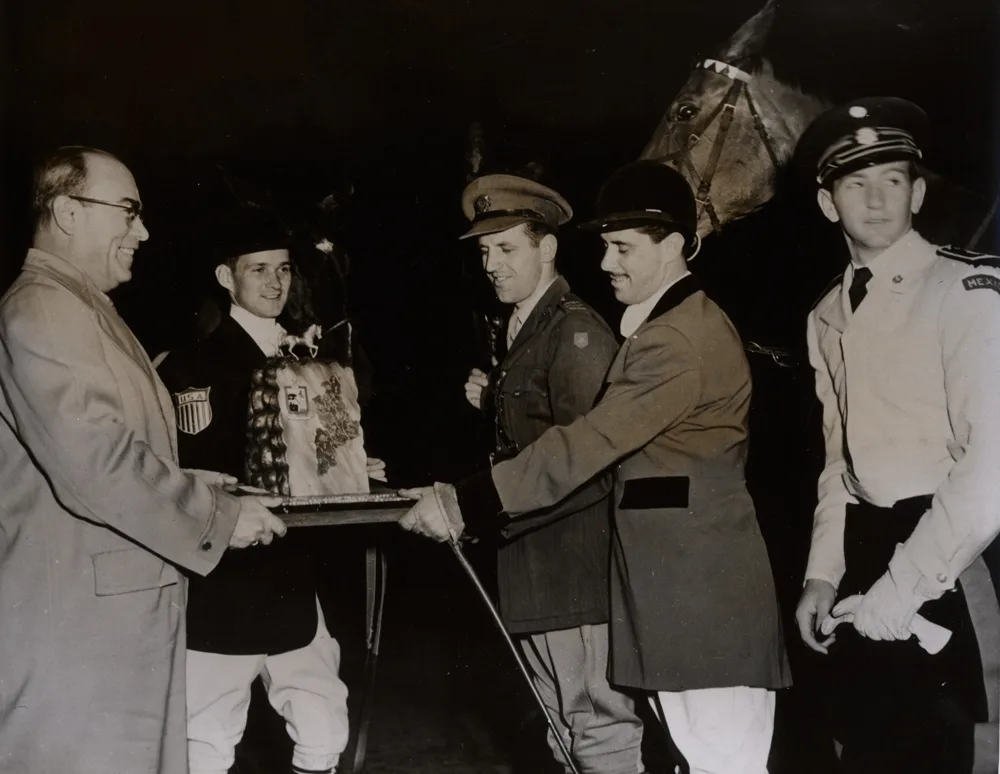Sept. 19, 1958
The Chronicle editor argues that money spent on the U.S. Equestrian Team will be beneficial to U.S. foreign policy.
These are troubled times. As the most powerful nation in the world it is probably inevitable—even though often painful—that we should be under more or less constant attack from some portion of the globe. Certainly no phase of American life has been more violently attacked in recent years than our foreign policy, not only by our most bitter enemies, but also by our oldest and staunchest allies.
How to win and retain the friendship of other countries is a problem which we have tried to meet in a variety of ways. We have tried gifts—of military forces and equipment, of money and credit, of technical assistance in the form of manpower and machines. As the economies of war torn and backward countries have struggled to their feet, we have tried to replace gifts, first with loans, and second (hopefully) with self-sufficiency.
Most of these measures have been highly satisfactory to the governments whose friendship we have sought to win and whose power as allies we have tried to increase. Unfortunately in all too many instances they have had a much less favorable impact upon the peoples of these countries without whose support the heads of state cannot long hold office. While we have concentrated primarily on the individuals in power, Russia has concentrated on the man in the street, so that Democracy, with far more to offer, has again and again been rejected for Communism.
ADVERTISEMENT
Naturally our State Department is not unaware of this situation. For many years it has carried on a number of activities designed to remedy it, perhaps the foremost being its Cultural Relations Division which in many countries maintains staffs quite comparable to those found in our Embassies and Consulates. In recent months the concerts given by Van Clyburn in Moscow and the defeat of the Russian chess masters in the Yugoslav tournament by 15 year old Bobby Fisher have had enormous propaganda value as far as the Russian people are concerned.
Even more effective than music or chess, however, are athletics which in most countries have a far broader appeal. Soviet Russia is fully aware of this, has recruited its outstanding athletes and has spent money freely in order to provide coaches, equipment and the opportunity to compete abroad, all toward the goal of winning the Olympic Games. As part of this program it subsidizes an Equestrian Team which year by year is becoming more formidable.
All this makes particularly significant the letter (which appears on this page) to Whitney Stone, President of the U.S. Equestrian Team from Scott McLeod, U.S. Ambassador to Ireland, tendering congratulations on the success of our Team at the Dublin Horse Show which he characterizes as “most beneficial to the operation of this Mission.” Ambassador McLeod continues: “It can certainly be said that they reach a much higher proportion of the population than have the other subsidized cultural activities undertaken by our Government. I would certainly favor an allotment from the United States cultural appropriations to support future appearances by such a fine group as this at the Dublin Horse Show.”
Ambassador McLeod has given us all a lead. Now let Chronicle readers take pen in hand and write our State Department, our Congressmen and our Senators letters which will back him up, support our Team, and put our own tax money where it will be really effective.
This article was first published on Sept. 19, 1958, in The Chronicle. It’s part of a series celebrating 75 years of Chronicle history.







